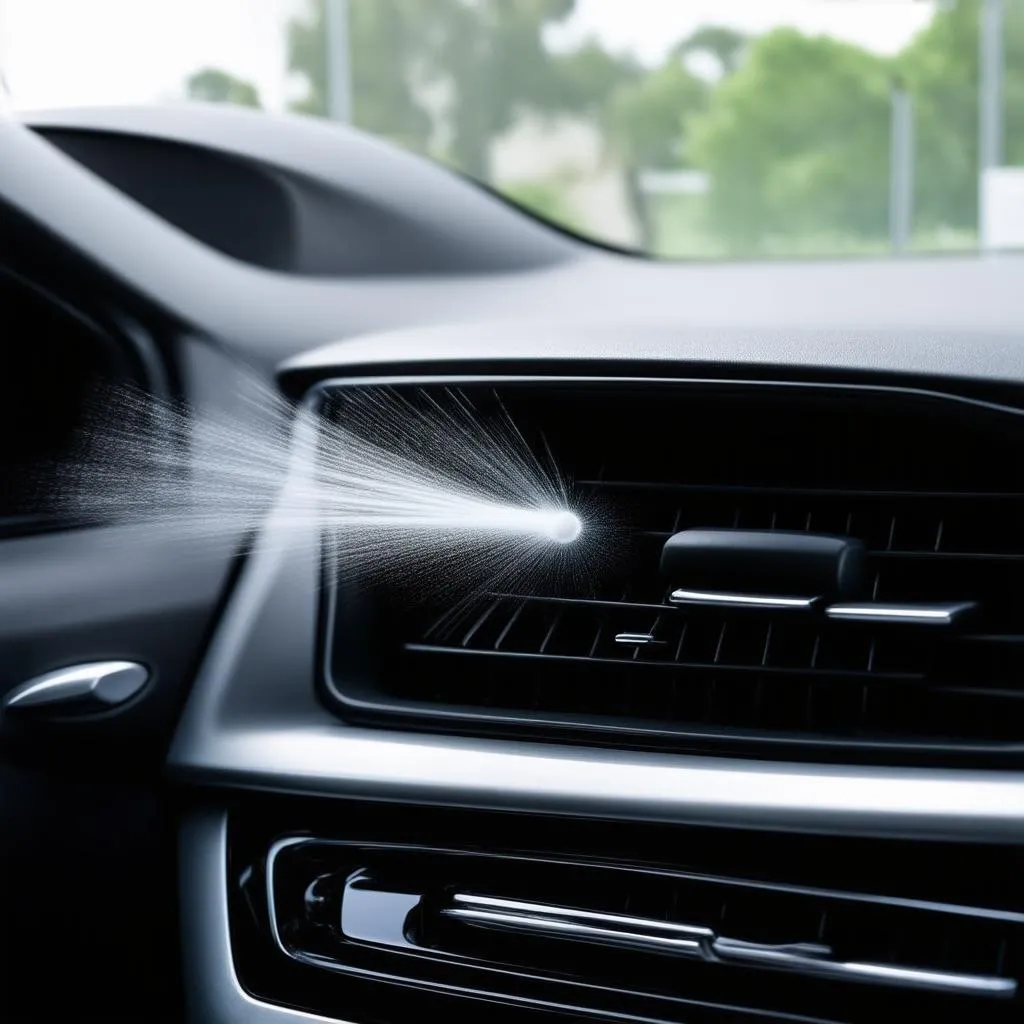Have you ever been driving your European car, minding your own business, when suddenly a warning light pops up on your dashboard? Your heart might skip a beat as you wonder, “What now?” If a code reader reveals a B1059 Obd Code, it’s understandable to feel a little lost. Don’t worry, we’re here to shed some light on this mysterious code and guide you through what it means for your vehicle.
Understanding the B1059 OBD Code
In the intricate world of automotive electronics, OBD codes are like messengers, each bearing specific information about your car’s health. The B1059 code, specifically, points to an issue within your car’s climate control system, particularly related to the air mix motor or damper actuator circuit.
But what does that even mean?
Imagine this: You’re trying to adjust the temperature inside your car, switching between hot and cold air. The air mix motor or damper actuator is responsible for blending the air to achieve your desired temperature. When the B1059 code crops up, it means there’s an electrical malfunction hindering this process, potentially leaving you with either a blast of icy air or a stifling heat wave inside your car – not exactly the comfortable ride you were hoping for!
Decoding the B1059: Symptoms and Causes
While a check engine light might be your first clue, several other symptoms might arise alongside the B1059 code:
- Inconsistent air temperature: You might notice that the air blowing from your vents doesn’t match the temperature setting on your climate control.
- Weak or no airflow: The air coming from your vents might be noticeably weaker than usual, or in some cases, there might be no airflow at all.
- Clicking noises from the dashboard: You might hear faint clicking sounds emanating from your dashboard, indicating the air mix motor or damper actuator struggling to function correctly.
So, what triggers this electrical hiccup in the first place? Several culprits could be responsible:
- Faulty air mix motor or damper actuator: Just like any other electrical component, the air mix motor or damper actuator itself can wear out or fail over time.
- Wiring issues: Damaged, corroded, or loose wiring within the climate control system can disrupt the electrical signals, leading to malfunctions.
- Blown fuse or faulty relay: A blown fuse or a malfunctioning relay can interrupt the power supply to the air mix motor or damper actuator, rendering it inoperable.
- Climate control module problems: In some instances, the issue might lie within the climate control module itself, which acts as the brain of your car’s climate control system.
What to Do When B1059 Strikes
Ignoring a B1059 code is like ignoring a dripping faucet – it might seem like a minor inconvenience initially, but it can lead to bigger problems down the road. So, what should you do when this code rears its head?
-
Diagnose the Issue: Don’t jump to conclusions! Start by confirming the B1059 code using an OBD-II scanner.
-
Check the Obvious: Before diving into complex repairs, check for simple fixes like a blown fuse or a loose wiring harness. Refer to your car’s manual to locate these components.
-
Consult a Professional: If the problem persists, it’s best to seek help from a qualified mechanic specializing in European cars. They can accurately diagnose the root cause and perform the necessary repairs.
 Car repair
Car repair
B1059: Frequently Asked Questions
Q: Can I still drive my car with a B1059 code?
While driving with a B1059 code might not render your car immobile, it’s not recommended. Ignoring the issue can lead to further damage to your climate control system, potentially resulting in costlier repairs in the future.
Q: How much does it cost to fix a B1059 code?
The repair cost can vary greatly depending on the underlying cause. A simple fuse replacement might only set you back a few dollars, while replacing the air mix motor or damper actuator can cost a few hundred dollars.
Q: Can I fix the B1059 code myself?
If you’re comfortable working on your car and have some electrical experience, you might be able to tackle minor repairs like replacing a fuse. However, for more complex issues, it’s best to leave it to the professionals.
Beyond B1059: Exploring Related Issues
The B1059 is just one piece of the puzzle when it comes to your car’s climate control system. Several related issues might arise, requiring similar diagnostic and repair approaches:
- B105A, B105B, B105C, B105D: These codes indicate issues with other components within the air mix motor or damper actuator circuit, suggesting potential problems with sensors or wiring.
- General climate control malfunctions: Issues like unresponsive buttons, inaccurate temperature readings, or strange noises from the dashboard might point to broader problems within the climate control system, requiring further investigation.
 Car air conditioning
Car air conditioning
Keep Your Cool: Partner with TechCarUSA for Expert Auto Repair
Dealing with car troubles can be frustrating, especially when it comes to intricate systems like your car’s climate control. But remember, you don’t have to navigate this alone!
At TechCarUSA, we’re passionate about providing top-notch automotive repair and maintenance services for European vehicles. Our team of expert mechanics understands the intricacies of these sophisticated machines and is equipped with the knowledge and tools to diagnose and repair any issue, including those pesky climate control problems.
Need help deciphering a B1059 code or tackling other automotive dilemmas? Contact us on WhatsApp at +84767531508. We’re here to keep your car running smoothly, ensuring a comfortable and enjoyable driving experience.
Your Car, Your Comfort Zone
Remember, your car should be an extension of your comfort zone, not a source of stress. By staying informed about common OBD codes like the B1059 and seeking professional help when needed, you can keep your car in tip-top shape and enjoy many miles of smooth, comfortable driving.
Have you ever encountered a B1059 code or other climate control issues? Share your experiences and insights in the comments below. We’d love to hear from you!
